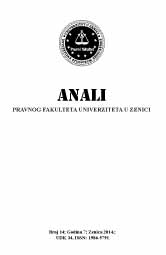PRAVNI POLOŽAJ POTROŠAČA KOD UGOVORA O TIMESHAREU – ANALIZA DIREKTIVE 2008/122/EZ
THE LEGAL POSITION OF THE CONSUMER IN TIMESHARE CONTRACTS - ANALYSIS OF DIRECTIVE 2008/122/EC
Author(s): Anita PetrovićSubject(s): Law, Constitution, Jurisprudence
Published by: Pravni fakultet - Univerzitet u Zenici
Keywords: timeshare; Directive 94/47/EC; Directive 2008/122/EC; consumer protection.
Summary/Abstract: The initial idea of a timeshare was to provide purchasers to spend their holidays enjoying the great accommodation at an attractive tourist destinations, paying only period when they use the property, and all other costs are shared with other users. A single legal regulation of timeshare at EU level began with the adoption of Directive 94/47/ EC, which aimed to create a minimum legal standards which will ensure the proper functioning of the common market of tourist services, and thus contribute to the protection of timeshare purchaser. Since Directive 94/47 / EC as an act of minimum harmonization failed to remove legal fragmentation and that the number of tourist products very similar to timeshare diversified over time, at 2009 was adopted a new, modernized Directive 2008/122/EC. The subject field of application have significantly expanded in a way that now are covered other timeshare like products, as well as schemes of sale or exchange. Subject of the classic timeshare were only properties while now Directive 2008/122/ES coveres also a mobile objects. Directive 2008/122 / EC is the act of targeted maximum harmonization, so it is expected its provisions will increase the safety of consumers in the timeshare, because one of the major problems that consumers are dealing with are various forms of unfair business practices, and lack of confidence in this legal work.
Journal: Anali Pravnog fakulteta Univerziteta u Zenici
- Issue Year: 7/2014
- Issue No: 14
- Page Range: 231-273
- Page Count: 43
- Language: Croatian

